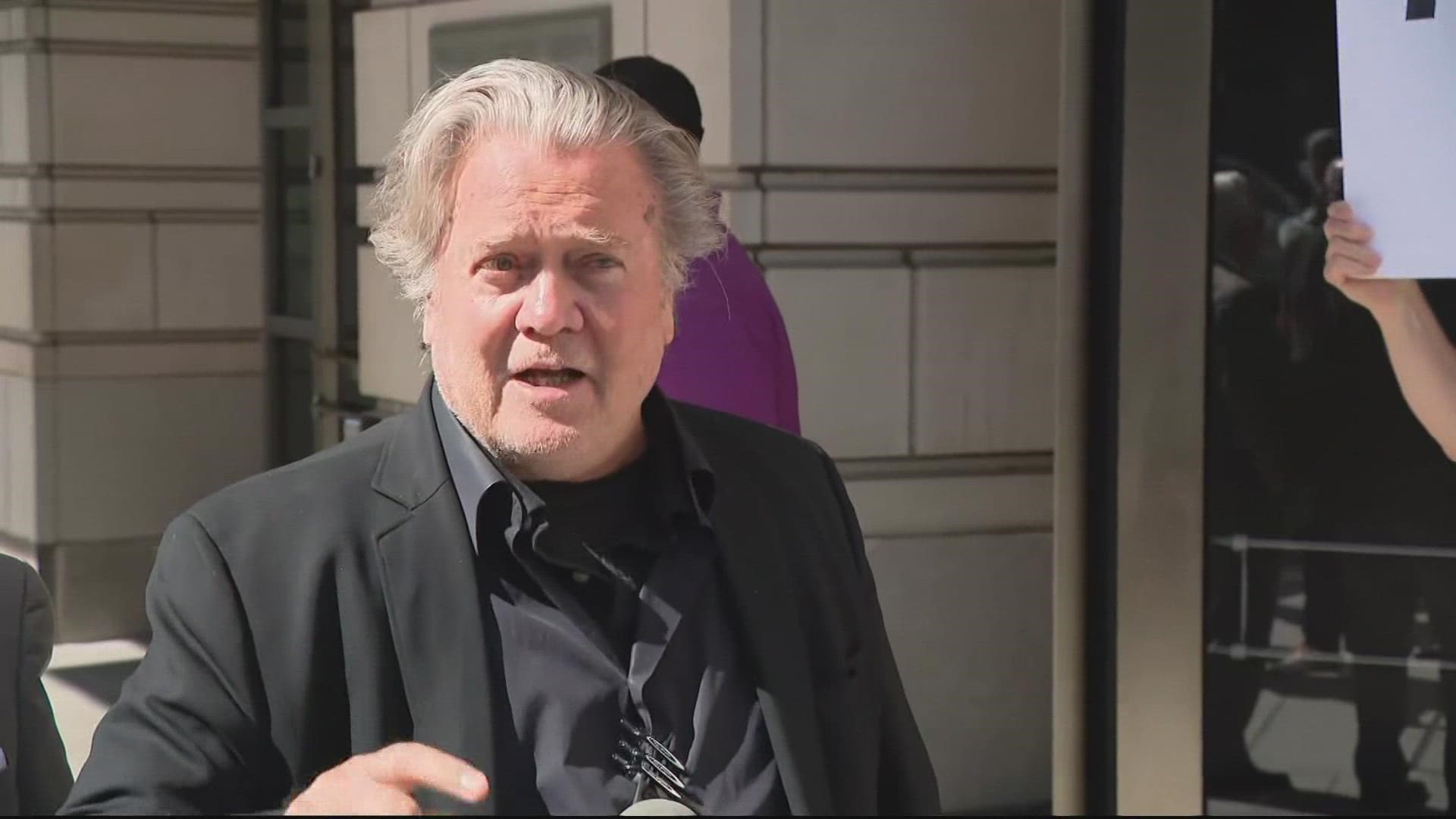WASHINGTON — Steve Bannon’s defense team rested their case in his contempt of Congress trial Thursday without presenting any witnesses or evidence on his behalf and without Bannon himself taking the stand.
The third day in Bannon's trial was was taken up almost entirely by arguments between Bannon’s attorneys David Schoen and Evan Corcoran and the prosecution. Corcoran used his portion of the morning to try to convince U.S. District Judge Carl Nichols to grant a motion for acquittal. Corcoran argued the government hadn’t proven its case that Bannon deliberately and intentionally defied a subpoena from the January 6th Committee when he failed to show up for a deposition on Oct. 14. Such motions are commonly filed by defendants in criminal cases and rarely granted by judges.
Instead of presenting a defense to jurors, Schoen, a civil rights attorney who represented former President Donald Trump during his second impeachment, made the case to Nichols why the Bannon should be able to subpoena and question Rep. Bennie Thompson (D-MS) and other members of the January 6th Committee. It’s an argument Schoen has made repeatedly since Bannon was indicted last November – most notably last week, when Nichols quashed subpoenas sent to multiple Democrats in Congress. At the time, Nichols said the U.S. Constitution’s Speech and Debate Clause granted them immunity from subpoenas.
FULL TRIAL COVERAGE
Schoen said without the ability to question Thompson, who chairs the committee and signed Bannon’s subpoena, his client could not “tell the story” of why he felt he was barred from complying. Bannon has claimed his attorney Robert Costello informed him Trump invoked executive privilege on his behalf, although both the committee and a Trump lawyer, Justin Clark, have disputed that assertion. Schoen said the defense also wanted to question Thompson and other members of the committee about why they chose not to pursue a civil enforcement action to resolve Bannon's executive privilege claim. Committee general counsel Kristin Amerling testified earlier in the week the committee did not do so because it did not view there as being any valid claim to resolve.
Assistant U.S. attorney Amanda Vaughn told Nichols what Bannon’s team wanted was to call Democrats to the stand to go on a fishing expedition for “irrelevant” information.
"They have no non-speculative basis to think that any member of that committee has any materially exculpatory information," AUSA Amanda Vaughn said. "The through-line of what Mr. Schoen said they wanted is really just trying to get at personal motivations of members."
When Nichols asked Schoen if the defense would be putting on a case, assuming he denied their motion to compel Thompson to testify, Schoen said no. Nichols decided to take both the motion for acquittal and the motion to compel Thompson to testify under advisement.
Before bringing in the jury for the first time all day to hear the defense rest its case, Schoen read an explanation for why Bannon was waiving his right to testify, and what he would have said if he was allowed to present an executive privilege defense.
Schoen said Bannon has “very much wanted” to testify since his indictment to tell his story – that he did not provide documents or testimony to the committee under advice of his attorney, Costello, because he believed he was bound by executive privilege.
“However, on the advice of counsel… he has decided not to testify because he understands he would be barred from telling the true facts and explaining why he did what he did, and why he did not do what he did not do,” Schoen said.
Prohibited from presenting that, Schoen said, jurors will be instructed Bannon's defense is that he believed the dates on his subpoena were not "fixed" but, rather, "malleable."
Jurors were told to return Friday morning for instructions and closing arguments. They will then receive the case and determine whether Bannon is guilty of two misdemeanor counts of contempt of Congress. If convicted, he faces a mandatory minimum sentence of 30 days in prison and a maximum sentence of up to one year for each count.
We're tracking all of the arrests, charges and investigations into the January 6 assault on the Capitol. Sign up for our Capitol Breach Newsletter here so that you never miss an update.

